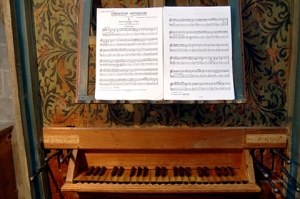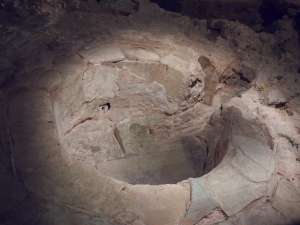In the course of research for a couple of purposes (a journal article and a course) I have had opportunity to read the church orders and church laws of the Dutch (Reformed) churches of the 16th and 17th centuries. I have been . . . Continue reading →
History of the Reformed Churches
1578 Synod Of Dort: Organs To Be Removed ASAP
77. We do not consider the use of organs in the churches to be good especially for the preaching (services). Therefore, we judged that ministers should labor, even though organs are tolerated for a time, that they be removed at the earliest . . . Continue reading →
Synod Of Dort (1578): Psalms Only To Be Sung In Worship
76. The Psalms of David translated by Pieter Datheen shall be sung in the Christian gatherings of the Netherlands churches as has been done until now, excluding the hymns which are not found in the Bible. National Synod of the Netherlands, German, . . . Continue reading →
The Reformed Churches Confess Infant Baptism
Some years back I published a book review in the pages of Modern Reformation magazine. Some responded with a letter to the editor complaining that I had distinguished between the Reformed churches and the Baptist churches. My revised response is below. § . . . Continue reading →
Are The Remonstrants Heretics?
This question comes over the transom regularly. I think most confessional Reformed pastors would probably say that, though they disagree strongly with Arminianism, it is not heresy. Somewhere I read (or heard) that William Ames (1576–1633), who served as an advisor . . . Continue reading →
The Dramatic Story Of Peter Martyr Vermigli
Pope Paul III, however, was not sitting idle in this rapidly changing climate. In 1542, after a failed attempt to conciliate Roman Catholics and Protestants at the Diet of Regensburg, he agreed on renewing the earlier practice of the Roman Inquisition under . . . Continue reading →
Two New Popular Biographies Of Zwingli
Since this is the 500th anniversary of Martin Luther’s 95 Theses (October 31, 1517) this has been understandably designated the “Luther Year.” There were, however, other figures in the Reformation, who made their own contribution. Huldrych (or Ulrich) Zwingli (1484–1531) is among . . . Continue reading →
New: Peter Martyr Vermigli For Children
In our age of screens (phones, tablets, computers, watches etc) it is counter-intuitive but nonetheless true to say that books are more important than they have been for a long time. They are more important precisely because our culture is drifting away . . . Continue reading →
Who Are The Reformers? Caspar Olevianus
Office Hours: Chad Van Dixhoorn On The Westminster Assembly
If you are Reformed or on your way to becoming Reformed you have probably heard and possibly read the Westminster Confession of Faith and perhaps of the Westminster Shorter Catechism. If you’re more experienced you might even have some experience of the . . . Continue reading →
Who Are The Reformers? Philipp Melanchthon
Source
Calvin Birthday 2016: Resources For Understanding Calvin
John Calvin was born on this date, 10 July 1509. He died in 1564. He was author of many volumes (including a massive Bible commentary, hundreds of personal letters, and public treatises), most famous of which is his Institutes of the Christian . . . Continue reading →
Zwingli On Sacramentarians And Infant Baptism (1529)
Others, like the sacramentarians, (those are justly called sacramentarians, who attribute to the sacraments what they do not contain, and by high-sounding but false and made-up promises, lead men away from simple trust in the one God to belief in the power . . . Continue reading →
The Martyrdom Of George Wishart 1 March 1546
On the sixteenth day of January, 1546, the Regent and cardinal arrived after night-fall at Elphingston Tower, in the neighbourhood of Ormiston, with five hundred men, and despatched the Earl of Bothwell to apprehend Wishart, holding themselves in readiness, if need were, . . . Continue reading →
Roger Nicole On Amyraut’s Testimony At Alençon (1637)
1. Naturally enough, in the explanations they gave, Amyraut and Testard sought to conform their presentation and language as closely as they could to the traditional Reformed views without making an outright disavowal of their previously printed sentiments. It would be difficult . . . Continue reading →
The Decline Of Psalmody In The Netherlands: Anabaptists, Remonstrants, And The State Church
In the Roman Catholic church the choir sings and the congregation was silent. Calvin also introduced singing by the congregation, and collected for it a bundle of Psalms of Clement Marot and Beza. He had the tunes composed by Louis Bourgois and . . . Continue reading →
Audio: St Bartholomew’s Day 1572: A Sixteenth-Century Massacre
In 1572 the French Reformed Church was nearly destroyed within the space of a week in an orgy of murder. This massacre was the result of some cold-blooded political and religious calculations and a growing distrust of and hatred toward French Reformed Christians . . . Continue reading →
Office Hours: What Happened To Reformed Orthodoxy? (1)
In the well-researched and written volume, Calvin Meets Voltaire: The Clergy of Geneva during the Age of Enlightenment, 1685-1798, Eighteenth-Century Studies Series (Ashgate: 2014), Jennifer Powell McNutt argued that there was more continuity, than has sometimes been thought, between 18th-century Genevan theology, . . . Continue reading →
St Bartholomew’s Day 1572: An Orgy Of Popular Violence
Long-range prospects for the Reformed churches in France appeared almost hopeful in the summer of 1572. The Peace of St. Germain (1570) that concluded the third civil war had granted significant political, military, and religious concessions to the Huguenots. The Catholic Duke . . . Continue reading →
The Difference Between Sola Scriptura And Biblicism
The Reformation solas (by grace alone, through faith alone, according to Scripture alone) are not well understood today. Yesterday, however, was the anniversary of Luther’s famous declaration at the Diet of Worms. Although already under ban for his teachings, Charles V had promised . . . Continue reading →











